Gugulethu chess rising
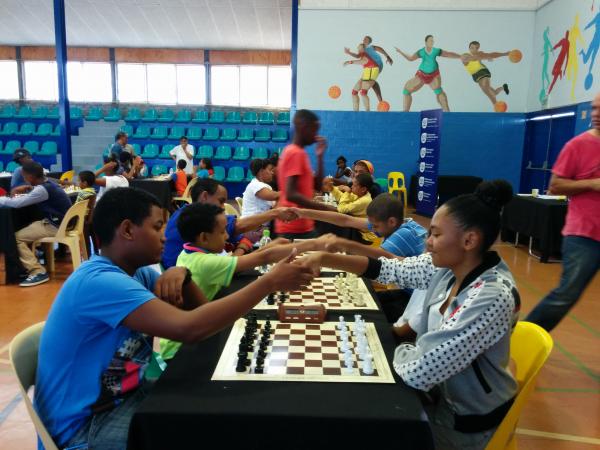
Once the playing begins, all that’s to be heard is the clanging of pieces and the thumping of clocks signalling that it’s “your move”. Today, chess took centre stage at the Gugulethu Sports Centre.
About 50 children from across the Cape Flats participated in this rapid-chess event. In this speedier version of chess, players get a small amount of time to finish the game. It’s a form of chess that has become increasingly popular because it makes for fast, exciting games and tournaments can be completed in a day. In today’s Gugulethu tournament, each player got 20 minutes to play all his or her moves. In that time you either have to checkmate your opponent, force him or her to resign or agree to a draw. But if you run out of time, you lose. The tournament is played over seven rounds. You don’t get knocked out if you lose. The format, known as the Swiss system, is wonderful for giving everyone a chance. Even if you lose a game you can make a comeback and win the tournament.
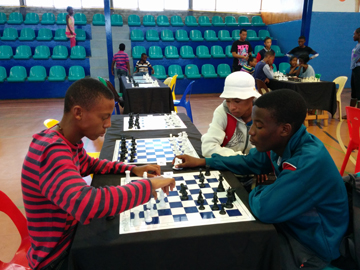
Jason Mathayi, Keagan Cupido and Elton Onitumbara enjoy a friendly game with some compulsory “kibitzing” between rounds.
Except when playing friendlies between rounds the players always use chess clocks. When it’s your move, your clock ticks away those 20 minutes, but as soon as you’ve made your move you punch a button on the clock which stops your time and start’s your opponent’s.
There were many more boys than girls, but this is usual in chess and the game does appear to be getting more popular with girls. Bongiwe Makubela enjoys chess and she believes it is benefiting her. She says it is developing her skills. “My maths is better because of my chess,” she proclaims.
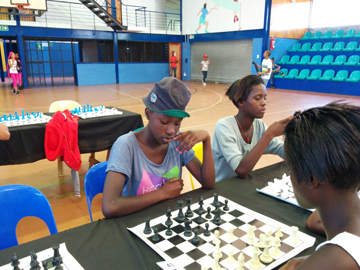
Bongiwe Makubela plays the black side in this friendly game.
The atmosphere in the tournament hall when a round is being played is tense. There’s dead silence except for the playing and no one dares give advice to anyone else; it would be against the rules. Children, no doubt often accused of having short attention spans, are locked in intense concentration for up to 40 minutes non-stop. But there’s a break after every round and the tension evaporates, with participants playing friendlies against each other. Then “kibbitzers” advise continuously and you frequently hear “why didn’t you play there?”, “you missed that” as well as the occasional expletive from an outfoxed player. Teaching also takes place: an older boy explains to a younger one how the pieces move, “A knight always makes an L shape,” he says. His young protégé then proceeds to move the knight incorrectly along the diagonal much to the older boy’s frustration.
If you touch a piece you have to move it. The players enforce this strictly in the tournament games, but less so in the friendlies between rounds.
The tournament was organised by the Western Cape Department of Cultural Affairs and Sport (DCAS). According to Jacqueline Fritz, who is an employee of DCAS and one of the co-organisers with her colleague George Daniels, a further 30 children from Gugulethu who didn’t know how to play were being coached while the tournament was on. She also said that parents were being encouraged to participate and play too. Fritz said that chess is not yet that popular in Gugulethu but the point of the event is to, “make Gugs aware of chess and to keep children off the streets.” Fritz described this as a “kickstart” event and said they hoped to organise another tournament in the township later this year.

Adults also played against each other.
Some of South Africa’s top players have, despite the hardships of township life, made it as professional chess players. International Master Kenny Solomon hails from Mitchell’s Plain and hopes to become South Africa’s first grandmaster. He is currently a grandmaster-elect, which means he is closet to getting this coveted title. Watu Kobese is also an international master and grew up in Soweto. He was South Africa’s number one player for several years.
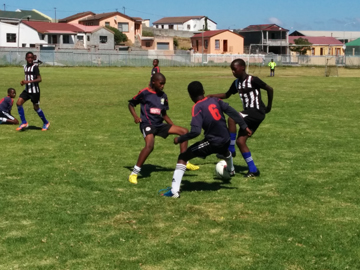
Elite XV vs Cape Town Pirates
Outside the tournament hall, two boys’ soccer teams, the Elite XV and Cape Town Pirates battled away with parents, supporters and coaches shouting advice from the touchline. The cerebral indoor chess tournament and the physical outdoor soccer one were contrasting encouraging sights, providing township children with an opportunity to develop their skills and dignity. With violence currently engulfing nearby Manenberg it would be wonderful if Saturday pastimes like these could be scaled up across the city, and help children find alternatives to life in a gang. A chess tournament for children and their parents every Saturday, and even Sunday, might just help.
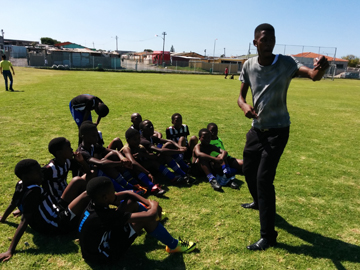
Nkosinathi Magida, coach of the Elite XV, instructs his young charges at half-time how to go about winning their game against Cape Town Pirates.

This article is licensed under a Creative Commons Attribution-NoDerivatives 4.0 International License.


